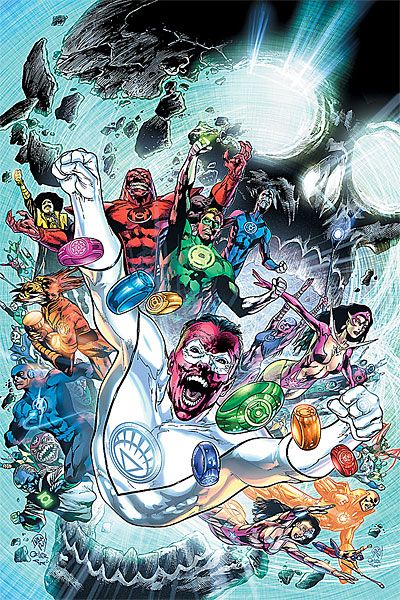"Blackest Night" #8 reads like a declaration of form. As if Geoff Johns and Ivan Reis are saying to the world, "this is what serialized spectacles look like," and "let's see you read this comic on an iPad!" This final issue is too big for a digital screen, too big, even for a normal-sized comic book. It demands that you turn the comic on its side on pages two and three, and then bursts open into a four-page centerfold spread in the middle, giving rebirth to a familiar cast of characters. So it's not only an oversized issue at 36 pages. It's an overstuffed issue, flipping open beyond its own borders.
I appreciate the boldness of its declaration.
It knows exactly what kind of comic it is and it doesn't back down. It doesn't worry about logic or subtlety. "Blackest Night" worries about one thing and one thing only: spectacle. Spectacle that reaffirms the primacy of the DC heroes, not as human beings struggling against overwhelming odds, but as icons battling on an epic scale.
Ivan Reis doesn't skimp on the artwork here. With usual inker Oclair Albert and help from Joe Prado, this is a comic book that avoids the pitfalls of previous DC events, at least visually. No backgrounds unlinked and sloppily colored here. No Marco Rudy coming in to draw a few pages. This is Reis at his ridiculous best, filling the page with characters in action, drawing the entirety of the Blackest Night conflict (all the heroes vs. all the resurrected Black Lanterns) on one double-page spread.
And though Geoff Johns's resurrection of a handful-and-a-half of DC's best and brightest (with a few surprises thrown in) doesn't come as any surprise at all to anyone who's been paying attention to (a) this series, and (b) the discussions about the upcoming "Brightest Day" series, Reis gives the resurrected characters an immediate nobility in the four-page centerfold. It's a poster waiting to happen.
"Blackest Night" has been, basically, one long fight scene from beginning to end. But it's a fight scene on such a vast scale, and based around such a primal conflict -- death vs. life -- that it has achieved a powerful effect. It's not the effect of a surprise ending or a shocking revelation, it's the effect of a storytelling machine that has satisfied its own promises. There's nothing in "Blackest Night" #8 that feels organic -- ironically, for a story that embraces the white light of life, it feels more like the product of a well-crafted team of mechanical creators -- but its precision is admirable. It hits the beats it needs to hit. It completes the story of Hal Jordan's resurrection by reaffirming that death isn't a necessary endgame for the DC heroes.
I prefer the overripe ambition of the "Final Crisis" finale, but I can't deny the satisfaction of seeing how everything played out in the end of "Blackest Night." We got what we came for, and a little bit more.

